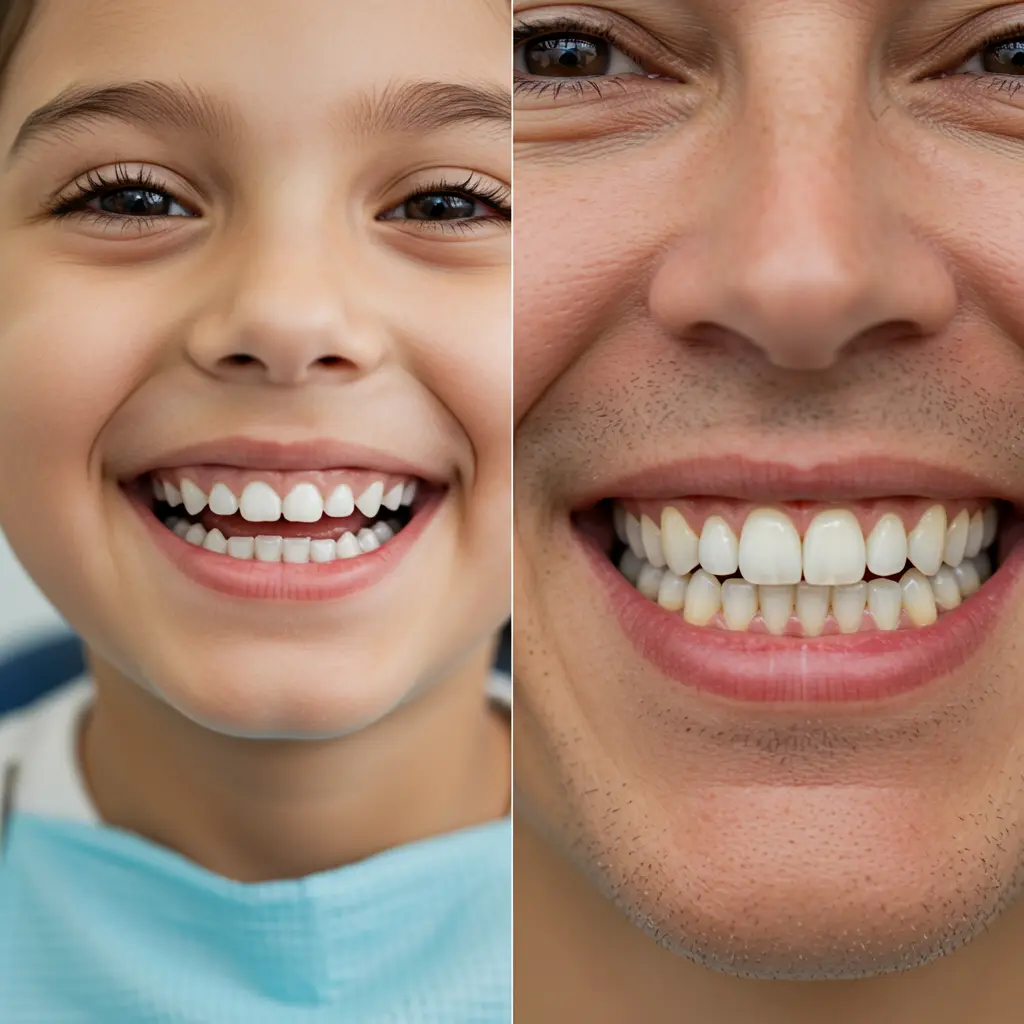Understanding the milk teeth vs permanent teeth difference is essential for every parent committed to promoting healthy smiles and long-term dental care for kids. Both sets of teeth serve vital roles, and knowing how they differ helps ensure that children receive the right dental attention at every stage of growth.
Also known as primary or baby teeth, milk teeth are the first set of teeth that appear in a child’s mouth. Typically, they begin to emerge around six months of age and are usually complete by age three. These teeth are smaller and whiter than permanent teeth, with thinner enamel, making them more vulnerable to decay.
Milk teeth may be temporary, but they are essential for proper chewing, clear speech, and guiding the eruption of permanent teeth. Consistent brushing and routine checkups with a pediatric dentist are key to keeping them healthy and functional.

Around the age of six, a child’s milk teeth begin to loosen and fall out. This natural transition phase is when permanent teeth begin to erupt. The process typically continues until the early teens, ending with the arrival of molars and, later, wisdom teeth.
A key distinction between baby teeth and adult teeth is their total count. Kids typically develop 20 primary teeth, whereas a full set of adult teeth includes 32 permanent ones.
Here’s a breakdown of important differences every parent should know:
Primary teeth tend to be smaller in size and brighter white in appearance, whereas adult teeth are generally bigger and have a natural yellow tint because of their denser enamel layer.
Number of teeth: 20 milk teeth vs 32 permanent teeth.
Enamel thickness: Permanent teeth have thicker enamel, making them more resistant to decay.
Root structure: Milk teeth have shorter roots that naturally dissolve to allow permanent teeth to emerge.
Longevity: Milk teeth are temporary, while permanent teeth last a lifetime with proper care.
Understanding these differences supports early oral education and effective dental care for kids.
Many parents wonder, “Why are milk teeth important?” The answer lies in the foundational role these early teeth play. Despite being temporary, they:
Neglecting milk teeth can lead to infections that may harm the developing permanent teeth below.
Pediatric dentistry focuses on ensuring the health of both milk teeth and permanent teeth. Regular dental visits, fluoride treatments, and proper brushing techniques are key to preserving oral health during the transition years.
It’s essential to instill good habits from a young age, such as brushing twice daily with fluoride toothpaste and avoiding sugary snacks that contribute to cavities.
Preventive care, such as sealants and professional cleanings, also helps protect milk teeth, ensuring a smoother transition to permanent teeth.
Here are a few practical ways to support your child’s dental care:
Following these steps can safeguard both sets of teeth and support long-term oral wellness.
Parents often face challenges during this dental transition. Some of the most common include:
Don’t hesitate to consult a pediatric dentistry expert if any unusual symptoms arise.
Understanding the difference between milk teeth vs permanent teeth empowers parents to provide better care. With the right habits, regular checkups, and guidance from professionals, children can enjoy strong and healthy smiles for life.
If you’re looking for expert pediatric care or advice on your child’s dental development, book a consultation at Unidental today. Their experienced team specializes in dental care for kids, ensuring a smooth transition from baby teeth to adult smiles.
Most children begin losing their milk teeth around age six, but the timeline can vary.
It can cause misalignment of permanent teeth. A dentist may use a space maintainer to prevent this.
Permanent teeth are usually larger, less white, and have deeper grooves than milk teeth.
Yes. They can cause pain and infection and may affect the development of permanent teeth.
Ideally by their first birthday or within six months of the first milk tooth erupting.
Hyderabad : +91 6305 971445
Anantapur: +91 70758 90089
Goa: +91 83266 32500
Mon to Sat 10:00AM to 8:00PM
Sun 10:00AM to 12:00PM

Our goal is to provide friendly, caring dentistry with the highest standards in general, cosmetic, and specialist treatments. We strive to be the best dental hospital for comprehensive oral care.
We use advanced dental technology to deliver safe, precise, and painless treatments for every patient.